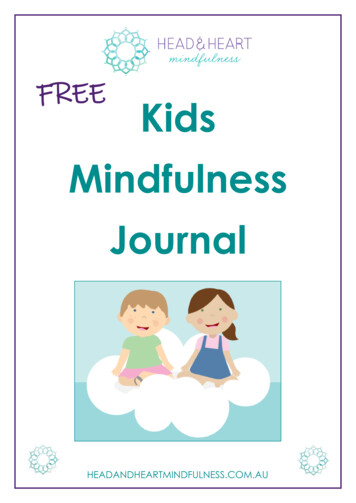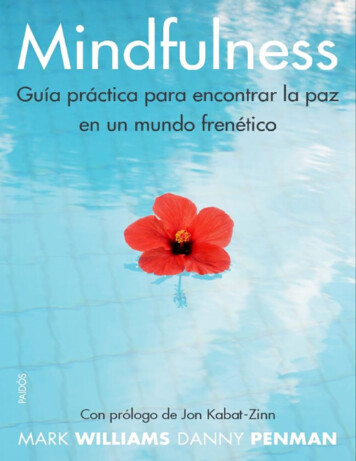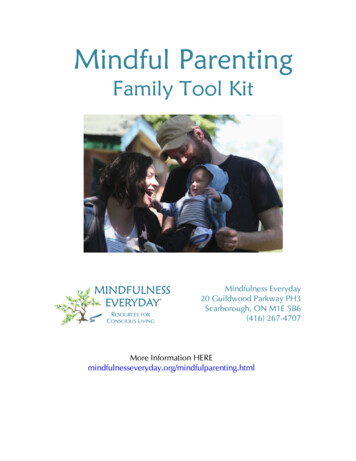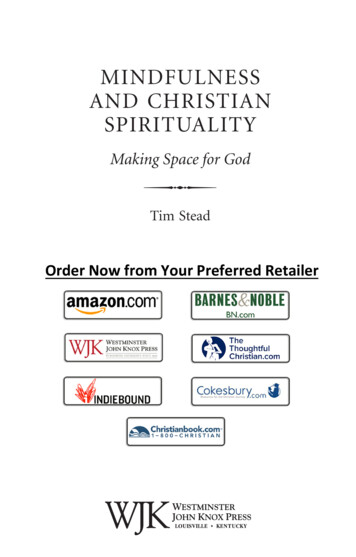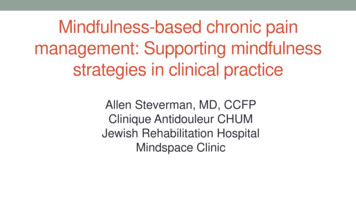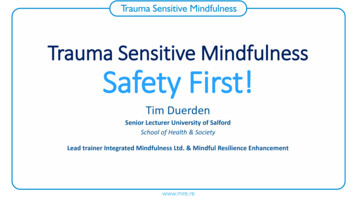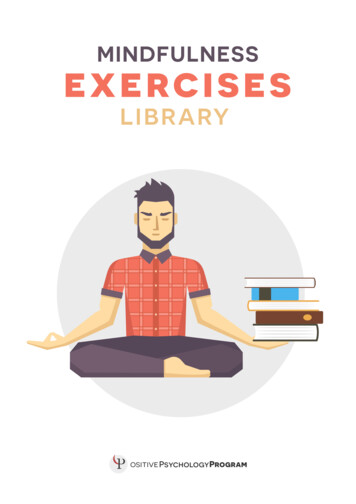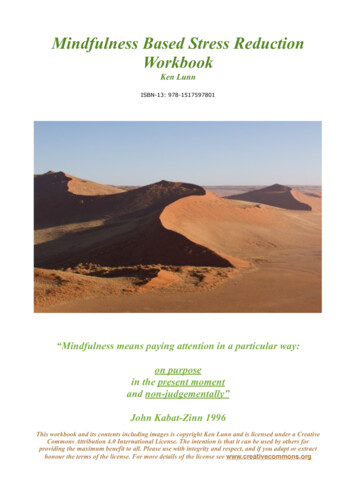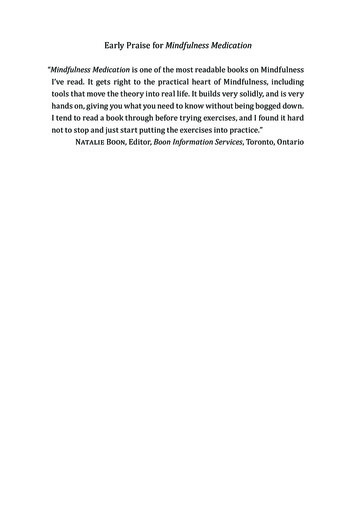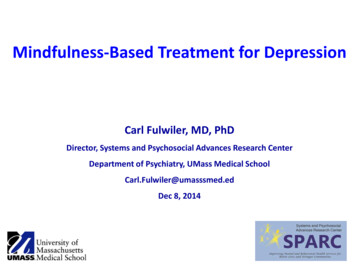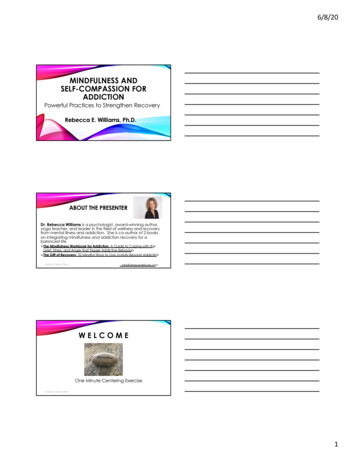
Transcription
6/8/20MINDFULNESS ANDSELF-COMPASSION FORADDICTION1Powerful Practices to Strengthen RecoveryRebecca E. Williams, Ph.D.2ABOUT THE PRESENTERDr. Rebecca Williams is a psychologist, award-winning author,yoga teacher, and leader in the field of wellness and recoveryfrom mental illness and addiction. She is co-author of 2 bookson integrating mindfulness and addiction recovery for abalanced life.ØThe Mindfulness Workbook for Addiction: A Guide to Coping with theGrief, Stress, and Anger that Trigger Addictive BehaviorsØThe Gift of Recovery: 52 Mindful Ways to Live Joyfully Beyond Addictionmindfulnessworkbook.comCreated by Dr. Rebecca Williams3WELCOMEØOne Minute Centering ExerciseCreated by Dr. Rebecca Williams1
6/8/20LEARNING OBJECTIVES4ü1. Provide a checklist on addiction: Five keyquestions to ask when the puzzle pieces don’t fittogether.ü2. Explore how mindfulness and self-compassion canbe applied to addiction treatment.ü3. How to incorporate mindfulness and selfcompassion skills into treatment with clients.Created by Dr. Rebecca Williams5TRICKY ADDICTION THINKINGWhat are some thoughts your patients may be having aboutalcohol and drug use? My problem is not as bad as other people’s problem. I don’t like groups, AA/NA is not for me. My family is making too big of a deal about my use. My boss is being a jerk when I come to work late. If I relapse, I’ll never recover from my addiction. That police officer was out to get me. Other thoughts you have heard: .Created by Dr. Rebecca Williams6ADDICTION SIGNS CHECKLISTPART 11. Trying to quit or cut down but can’t2. Increase in amount of alcohol/drugs needed to feel buzzed3.4.5.6.7.(tolerance)Urgency in obtaining first drink or drug (feeling itchy)Blackout, memory lapses, during or after usingSneaking to useMaking excuses for drug or alcohol useUsing while alone, or hiding all evidence of usingCreated by Dr. Rebecca Williams2
6/8/207ADDICTION SIGNS CHECKLISTPART 28. Avoiding family and friends if they express concern about your use9. Drinking or using more than other others at social events10. Using alcohol or drugs to “forget” your problems11. Financial, legal, medical, family and/or work problems due toalcohol or drug use12. Loss of interest in activities and increase desire to get “high”13. Doing things under the influence of drugs or alcohol that causeshame or regret laterCreated by Dr. Rebecca Williams8ADDICTION SIGNS CHECKLISTPART 314.15.16.17.18.19.20.Neglecting important responsibilities in order to useUnable to talk about the problem with othersDenial about the seriousness of the addiction problemNot eating properlyNot sleeping wellNot taking care of yourself or your hygieneTaking risks that may be harmful to yourself and others (unsafe sex,driving while high)(score 10 or more checked boxes should be discussed with the provider)Adapted from The Mindfulness Workbook for Addiction, page 110.Created by Dr. Rebecca Williams9ADDICTION SIGNS Can you ask your patients to fill out this AddictionSigns Questionnaire prior to the visit? Use Questionnaire as a conversation starter. “Tell me about:#4 (memory lapses),#10 (forget your problems), or#18 (sleep problems)”Created by Dr. Rebecca Williams3
6/8/2010OBJECTIVE #1:U.N.I.T.E. YOUR 5 QUESTIONS Unite means to bring together for acommon purpose or action. These 5 questions are designed help youand the patient work together to makesense of the health concerns they arehaving.Created by Dr. Rebecca Williams11FIVE KEY QUESTIONS TO ASK WHEN THEPUZZLE PIECES DON’T FIT TOGETHERQuestion 1: UAre you having difficulty calming yourself down? (UNCOMFORTABLE FEELINGS)Question 2: NAre you beating yourself up due to certain behaviors? (NEGATIVE THOUGHTS)Question 3: IWhat ways might alcohol or drugs be getting IN THE WAY of your mental health?Question 4: THave you experienced a TRAUMA OR LOSS within the past year?Question 5: EWhat ENRICHING RELATIONSHIPS are available for you right now?Created by Dr. Rebecca Williams12UNITE: QUESTION 11. Are you having difficulty calming yourself down?(Uncomfortable Feelings) Do you use drugs or alcohol to “take the edge off?” Is it easy for you to get and stay angry? Are you stressed more days out of the week? Do you have days of sadness or depressed mood? Have you stopped your yoga or meditation practice orstopped exercising?Created by Dr. Rebecca Williams4
6/8/2013UNITE: QUESTION 22. Are you beating yourself up because of certainbehaviors? (Negative Thoughts) Do you have an inner critic that is constantly judging you? Is your mind filled with destructive thoughts? Do you wake up in the morning thinking harsh things aboutyourself? Do you think you should be punished?Created by Dr. Rebecca Williams14UNITE: QUESTION 33. What ways might alcohol or drugs be getting In TheWay of your health and mental health? Are you having sleep problems? Are you eating too much or too little, or unhealthy foodchoices? Are you anxious or worried most of the time? Are you sad or depressed most of the time? Do you have more than usual stress at work or home? Are you unable to have fun or joyful moments?Created by Dr. Rebecca Williams15UNITE: QUESTION 44. Have you experienced Trauma or Loss within thepast year? Have you noticed you drank more/used drugs after thistrauma or loss? Do you reach for alcohol or drugs to cope with your feelingsaround the loss? Do you feel you have grieved this loss? Do you have someone to talk to about this trauma or loss?Created by Dr. Rebecca Williams5
6/8/2016UNITE: QUESTION 55. What relationships are Enriching for you right now? Who are the supportive people in your life?Is there someone you can call when things feel out of balance?Are you attending a support group, in person or on line?Do you know anyone else who has gone through somethingsimilar? Is there a mental health professional you can contact forsupport? Are you connected to a spiritual or religious group/church?Created by Dr. Rebecca Williams17OBJECTIVE #2EXPLORE HOW MINDFULNESS &SELF-COMPASSIONCAN BE APPLIED TOADDICTION TREATMENT?Created by Dr. Rebecca Williams18WHAT IS MINDFULNESS?Being aware, in the present moment,without judgment.Kabat-ZinnüA way to calm the mindüA way to decrease distracting thoughts and feelingsüA way to focus attention on the present momentüA way to decrease the critical mindüA way to loosen control over our experiencesCreated by Dr. Rebecca Williams6
6/8/2019WHAT ARE THE BENEFITS OF MINDFULNESS? Better mental health Better physical health Better performance onintellectual tasks Better performance onphysical tasks Better recovery time from illnesses Better productivity with lower stressCreated by Dr. Rebecca Williams20WHAT ARE THE BENEFITS OFMINDFULNESS ON ADDICTION?Practicing mindfulness has been shown to: 1. Decrease craving2. Improve mental health – decrease anxiety and depressive mood3. Increase self-compassion4. Improve ability to cope5. Decrease post-traumatic symptoms 6. Decrease drug and alcohol use overall 7. Reduce the risk for relapseCreated by Dr. Rebecca Williams21RESEARCH ON MINDFULNESSü“Targeted mindfulness practices may support long-term outcomes by strengtheningthe ability to monitor and skillfully cope with the discomfort associated with cravingor negative effect, thus supporting long-term outcomes.” 1ü“Current evidence suggests that mindfulness-based interventions can reduce theconsumption of several substances including alcohol, cocaine, amphetamines,marijuana, cigarettes, and opiates to a greater extent than waitlist controls,educational support groups, and control groups.” 3ü“Large effect associated to levels of perceived craving, negative affectivity, andpost-traumatic symptoms.” 2ü“Mindfulness-based relapse prevention may affect numerous brain systems and mayreverse, repair, or compensate for neuroadaptive changes associated withaddictive-behavior relapse.” 4Created by Dr. Rebecca Williams7
6/8/2022NEUROLOGICAL BASIS FORMINDFULNESS People with substance use problems experience problems in 3 areasof the brain responsible for Attention, Emotion, and BehavioralRegulation. 10 They react to cues by resorting to using rather than waiting or copingwith the problem. Training in Mindfulness helps the person: be aware in the moment detach from thoughts, emotions, and sensations that arebothersome perceive the world as it isCreated by Dr. Rebecca Williams23F.L.O.A.T. EXERCISESimple Steps to Pause, Reflect, Re-center when TriggeredF L O A T Find Your Silent PlaceLet Go of JudgmentObserve Your ThoughtsAwareness of Your EnvironmentThankful for the ExperienceCreated by Dr. Rebecca Williamsadapted from The M indfulness W orkbook for Addiction, pages 80-8124If you want others to be happy, practicecompassion. If you want to be happy, practicecompassion.Dalai Lama XIVCreated by Dr. Rebecca Williams8
6/8/2025COMPASSION: 5 ELEMENTSCompassion composed of five elements:1. recognizing suffering2. understanding the universality of human suffering3. feeling for the person suffering4. tolerating uncomfortable feelings5. motivation to act to alleviate suffering (6)Created by Dr. Rebecca Williams26SELF-COMPASSION STARTERS“Self-compassion is compassion directedinward. We care about ourselves when facedwith suffering or pain.”Kristin Neff“If your compassion does not include yourself, itis incomplete.”Jack KornfieldCreated by Dr. Rebecca Williams27SELF-COMPASSIONOriginates from Buddhist teachings Three main elements1. self-kindness – be understanding andsupportive to yourself2. common humanity – all of us makewrong decisions and struggle3. mindfulness – awareness of our negativitywithout judgmentCreated by Dr. Rebecca Williams9
6/8/2028SELF-COMPASSION: BEST FRIEND Be as kind to yourself as yourbest friend would be to you. Acknowledge that challengesand setbacks are a normal partof life. Coach yourself through difficulttimes with kindness andacceptance.Created by Dr. Rebecca Williams29RESEARCH ON SELF-COMPASSION“Substance use disorder risk has an inverse relationship to selfcompassion. Raising self-compassion may be a usefuladdition to substance use disorder prevention and treatmentinterventions.” 7“Self-compassion is negatively related to PTSD severity and toemotion dysregulation. And is positively related to resiliencein people who have experienced trauma.” 8“Positive components of self-compassion are stronglypositively correlated with health-promoting behaviors.” 5Created by Dr. Rebecca Williams30OBJECTIVE #3HOW DO WE INCORPORATEMINDFULNESS AND SELF COMPASSIONSKILLS INTO TREATMENT?Created by Dr. Rebecca Williams10
6/8/2031EXPERIENCE THE BENEFITS“There is no end to the opening up that ispossible for a human being.”Charlotte Joko BeckCreated by Dr. Rebecca Williams32BENEFITS OF SELF-COMPASSION: 11. less anxiety and depression2. less rumination3. activates self-soothing system – lowers stresshormone cortisol4. better perspective on problems 9Created by Dr. Rebecca Williams33BENEFITS OF SELF-COMPASSION: 25. associated with positive psychologicalstrengths - emotional intelligence, wisdom,life satisfaction, and feelings of socialconnectedness6. more optimistic and enthusiastic7. better coping with emotional challenges8. improves interpersonal functioningCreated by Dr. Rebecca Williams11
6/8/2034EASY SKILLS TO RECOMMEND TOCLIENTS 1ØDaily Affirmations: on phone, write it down, post it notesØ(The Gift of Recovery has 365 affirmations!)Ø10 minute meditationsØFocus on your breath, take a “breath break”ØNotice a thought and label it “thought”ØUse imagery to let go of thought:ØLeaf down a streamØClouds in windy skyCreated by Dr. Rebecca Williams35EASY SKILLS TO RECOMMEND TOCLIENTS 2ØCreate a sanctuary at home just for sitting quietlyØConnect with others from a compassionate heartØLoving-kindness meditationØRead books that cultivate quiet and stillnessØUse apps that guide you through meditationØGet back in natureCreated by Dr. Rebecca Williams36EASY SKILLS TO RECOMMEND TOCLIENTS 3ØMusic as a soothing background to stillnessØPhysical practice yoga, Tai chiØMindful walkingØDaily journalingØBe present with childrenØSpend time with animalsØVolunteerCreated by Dr. Rebecca Williams12
6/8/2037LOVING-KINDNESS MEDITATION May I be happy May I be safe May I be healthy, peaceful, and strong May I give and receive appreciation today May you be happy May you be safe May you be healthy, peaceful, and strong May you give and receive appreciation todayCreated by Dr. Rebecca Williams38Breath BreakBCreated by Dr. Rebecca Williams39RESOURCES ON MINDFULNESS &RECOVERYCreated by Dr. Rebecca Williams13
6/8/2040RESOURCES FOR YOUR PATIENTSCreated by Dr. Rebecca Williams41QUESTIONSCreated by Dr. Rebecca Williams42REFERENCES1. Bowen, et al (2014). Relative efficacy of mindfulness-based relapse prevention, standardrelapse prevention, and treatment as usual for substance use disorders. JAMA Psychiatry,May; 71(5):547-56.2. Cavicchioli, Movalli, & Maffei (2018). The clinical efficacy of mindfulness-basedtreatments for alcohol and drug use disorders: A meta-analytic review of randomized annonrandomized controlled trials. Eur. Addict. Res. 24(3):137-162.3. Chiesa & Serretti (2014). Are mindfulness-based interventions effective for substance usedisorders? A systemic review of the evidence. Substance Use and Misuse, Apr;49(5):492512.4. Holden, et al (2020). Does how you treat yourself affect your health? The relationshipbetween health-promoting behaviors and self-compassion among a community sample.J. Health Psychol. Mar.5. Garland & Howard (2018). Mindfulness-based treatment of addiction: Current state ofthe field and envisioning the next wave of research. Addict. Sci. & Clin. Pract, Apr:13:14Created by Dr. Rebecca Williams14
6/8/2043REFERENCES6. Neff, & Dahm. (2015)) Self-compassion: What it is, what it does, and how it relates tomindfulness. In Ostafin, Robinson, & Meier (eds). Self-Regulation and Mindfulness.7. Phelps, et. Al (2018). The relationship between self-compassion and risk forsubstance use disorder. Drug Alcohol Depend. Feb 1;(183: 78-81).8. Scoglio, et al (2018). Self-compassion and responses to trauma: The role of emotionregulation. Journal of Inter. Violence Jul:33(13):2016-2036.9. Strauss, et al. (2016). What is compassion and how can we measure it? A review ofdefinitions and measures. Clin. Psychol. Rev Jul; 47;15-8.10. Witkiewitz, Lustyk, & Bowen (2013). Retraining the addicted brain: A review ofhypothesized neurobiological mechanisms of mindfulness-based relapse prevention.Psychol. Addict. Behav. Jun; 27(2): 351-365.Created by Dr. Rebecca Williams15
from mental illness and addiction. She is co-author of 2 books on integrating mindfulness and addiction recovery for a balanced life. ØThe Mindfulness Workbook for Addiction: A Guide to Coping with the Grief, Stress, and Anger that Trigger Addictive Behaviors ØThe Gift of Recovery: 52 Mindful Ways to Live Joyfully Beyond Addiction
